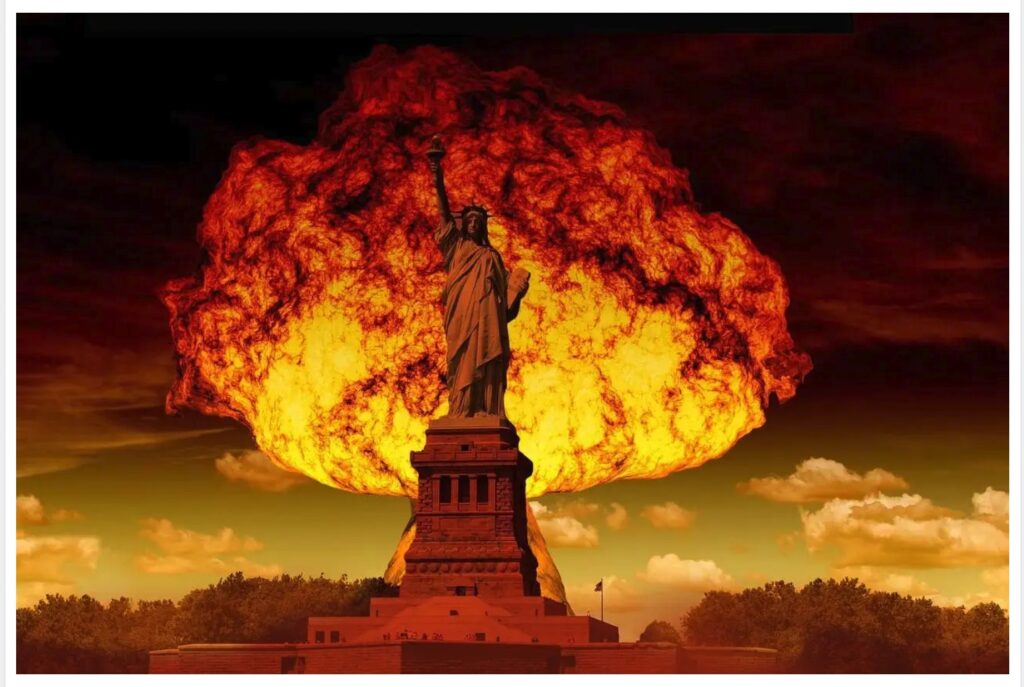To President Volodymyr Zelenskyy and Ukraine, Crimea and the Donbas are national territories whose retrieval justifies all-out war to expel the invading armies of Vladimir Putin’s Russia.
Yet, who controls Crimea and the Donbas has, in the history of U.S.-Russian relations, never been an issue to justify a war between us.
America has never had a vital interest in who rules in Kyiv.
Through the 19th and almost all of the 20th century, Ukraine was part of the Russian Empire or the USSR, ruled from Moscow. And that condition presented no issue of concern to the USA, 5,000 miles away.
For us, the crucial concern in this Ukraine-Russia war is not who ends up in control of Crimea and the Donbas, but that the U.S. not be sucked into a war with Russia that could escalate into a world war and a nuclear war.
That is America’s paramount interest in this crisis.
Nothing in Eastern Europe would justify an all-out U.S. war with Russia. After all, Moscow’s control of Eastern and Central Europe was the situation that existed throughout the Cold War from 1945 to 1989.
And the U.S. never militarily challenged that result of World War II.
We lived with it. When Hungarians rose up in 1956 for freedom and independence, the U.S. refused to intervene. Rather than risk war with Russia, the Hungarian patriots were left to their fate by President Dwight Eisenhower.
How the world has changed in the 21st century.
Today, while the U.S. is under no obligation to go to war for Ukraine, we are obliged, under the NATO treaty, to go to war if Slovakia, Czechia, Bulgaria, Romania, Hungary, Poland, Lithuania, Latvia or Estonia are attacked.
And, though Kyiv is not a member of NATO, the U.S. finds itself the financier and principal armorer of Ukraine in a war with Russia over Crimea and the Donbas, which could involve the use of nuclear weapons for the first time since Nagasaki.
In short, our vital interest — avoidance of a U.S. war with a nuclear-armed Russia — may soon clash with the strategic war goals of Ukraine — i.e., full retrieval of Crimea and the Donbas.
If Putin is serious about an indefinite war to hold Crimea and the Donbas as Russian territory, how far are we willing to go to aid Ukraine in driving the Russians out and taking these lands back?
What appears to be emerging is a situation something like this:
As U.S. weapons help drive Russian soldiers out of the occupied regions of Ukraine, Russia and Putin are being driven into a corner, where the alternatives left to them shrink to two: accept defeat, humiliation and all its consequences, or escalate to hold onto what they have.
At some point, escalation to prevent defeat can require crossing the nuclear threshold. And Putin and his retinue have said as much.
Bottom line: At some point in this conflict, achieving the war aims of Ukraine must force Moscow to consider escalation or accept defeat.
For Russia, the worse the war situation is, the sooner comes the day when Putin must either play his ace of spades to avoid defeat, or accept defeat, humiliation and his potential overthrow in Moscow.
As Russia’s use of nuclear weapons could lead to a war that could involve the United States, Kyiv’s relentless pursuit of its vital interests — retrieval of all the lands taken by Russia, including the Donbas and Crimea — will eventually imperil vital U.S. interests.
If Kyiv, with U.S. weapons and support, pushes the Russians out of Crimea and the Donbas, Kyiv pushes its war with Russia closer and closer to a nuclear war.
As Kyiv seeks to reconquer all its territory lost to Russia since 2014, it pushes Russia closer and closer toward consideration of the only way to avert defeat and national humiliation, use of tactical nuclear weapons, which means moving closer to war with the United States.
The higher the casualty rates for Putin’s Russia, the worse the defeats inflicted on Russia by U.S.-armed and -equipped Ukrainians, the greater the likelihood Russia plays its ace of spades, nuclear weapons, to stave off defeat and humiliation and ensure the survival of the regime.
In short, the closer Putin comes to defeat, the closer we come to nuclear war, for that increasingly appears to be the only way Putin can prevent a Russian defeat, disgrace and humiliation.
Americans had best begin to consider what is the outcome to this war that can end the bloodshed, restore much of Ukraine to Kyiv, but not be seen as a historic humiliation for Russia.
Some Americans see this war as an opportunity to inflict a defeat and disgrace on Putin’s regime and Russia. Those seeking such goals should recognize that the closer they come to achieving their goals, the closer we come to Russia’s use of nuclear weapons.
Recall: President John F. Kennedy sought to provide an honorable way out of the Cuban missile crisis for the Soviet dictator and nation who precipitated it.




Here’s where Buchanan’s article goes awry: ” What appears to be emerging is a situation something like this: As U.S. weapons help drive Russian soldiers out of the occupied regions of Ukraine, Russia and Putin are being driven into a corner, where the alternatives left to them shrink to two: accept defeat, humiliation and all its consequences, or escalate to hold onto what they have.” In case you haven’t been following the war, Patrick, the Ukrainian military has little to nothing left of its air force, navy, marines , air defenses, command-and-control centers, and frontline battalions. And until the recent partial mobilization, Russia hadn’t even deployed its regular army–just its professional regiments, allied militias, and mercenaries. And the NATO military equipment has been lalmost entirely a bust. Zelensky will be soon living in a mansion in Miami and doing comedy clubs across the U.S–if the CIA allows him to live that long.
And the US had nothing to do with Ukraine in 2014, eh Pat? What world do you live in?